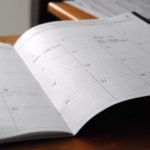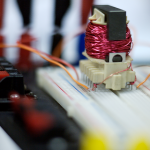

An engineer’s life is never boring: one day you are connecting some wires and the next day you are completing your robot warrior. Managing your time and handling all your tasks can be challenging, so I’d like to share some tips that helped me while working on my engineering degree. Good luck!
 1. Prepare, prepare, prepare:
1. Prepare, prepare, prepare:
With a lot of material to cover and plenty of opportunities to apply your knowledge, it is important to prepare so as not to lose yourself in the sea of information. Go over the reading material suggested by your professor, get a notebook and organize it based on topics, important concepts and calculations. When the time comes, having these within hand’s reach will help you get things done much better, and much faster.
 2. Write down everything
2. Write down everything
When attending lectures, try to listen for key words and concepts and write these down, as they might prove important in the future! Often these concepts will help you solve a question, understand the topic better or provide another way to look at something you have learned. Who knows, maybe the concept with that weird name you heard once in class will be the topic of your Nobel-worthy future thesis?
 3. Create a timeline
3. Create a timeline
Now that you are prepared and your notes are as organized as a dictionary, it is time to do some actual work. Create a timeline: a plan detailing what to do each day. And always give yourself at least a day to go over what you have done and fix any mistakes. If your coursework solution is perfect, you have earned yourself a break.
 4. Let your creativity flow
4. Let your creativity flow
If you study engineering, you probably love to build and break stuff. One of the best methods to learn is to apply. If you learn something in a lecture, try and apply it in real life! Get an electronics kit and build the circuit shown in class. This way you use your knowledge in a real-world environment. Who said you cannot have fun while studying?
 5. Make a list of questions
5. Make a list of questions
This tip has helped me countless times. When you learn something new, try and write some questions you have about it. Do this for each subject and have a question pool ready. In many cases, the lecture material will address most of these questions, but if not, you can always ask your professor or TA. This way you will solidify your understanding as well as add a personal touch to the topics that you learn. Using these questions and answers along with a revision is a great way to prepare for exams.

Leave a Reply